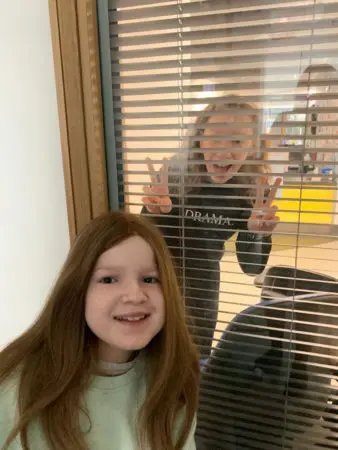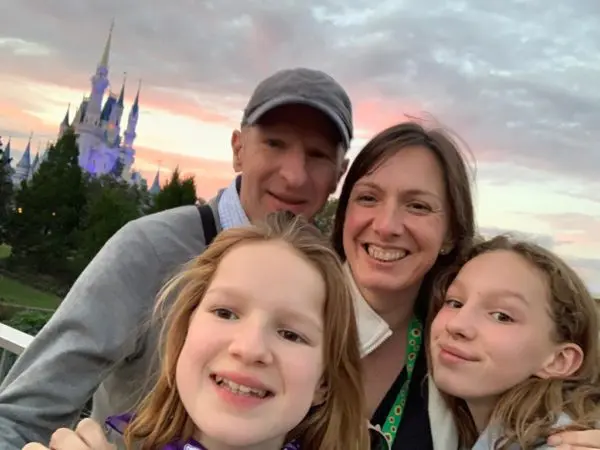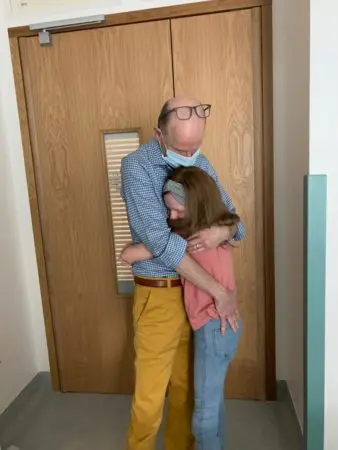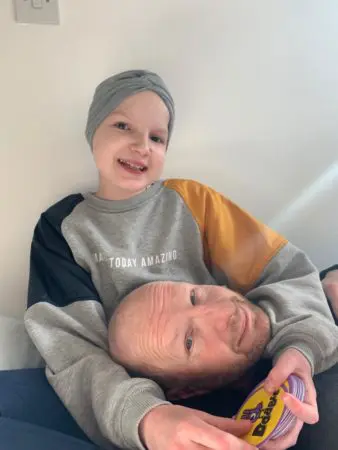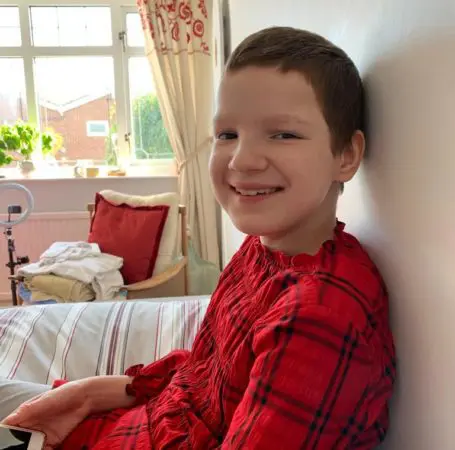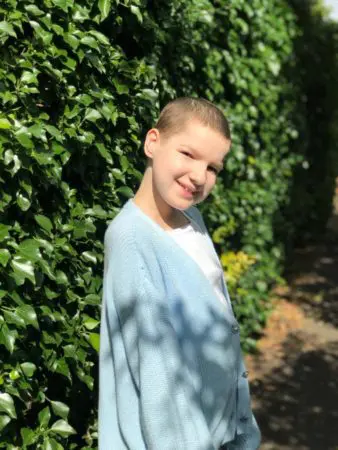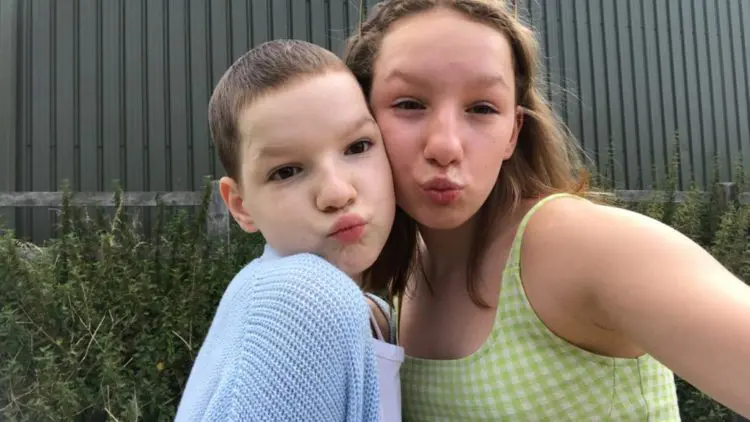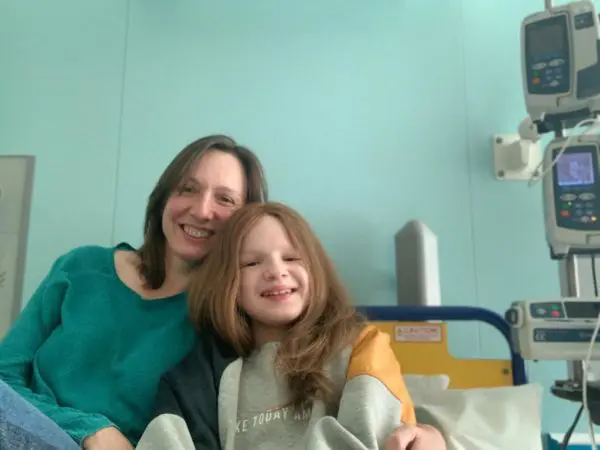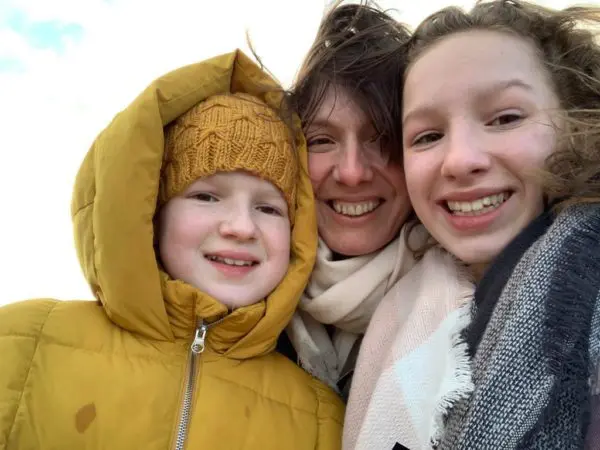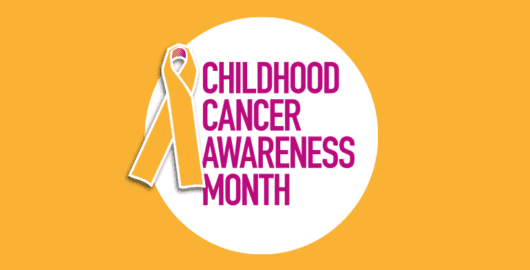Maisie’s story: ‘he said you need to do it now – the more we delay the more risk there is for her’
Maisie was first diagnosed with leukaemia in January 2016, aged 7. After being in remission for over a year and a half, the cancer then returned almost exactly four years after her initial diagnosis in January 2020.
As the country went into lockdown, Maisie started radiotherapy treatment and then on the 1st April she received the life-saving transplant from her sister, Cecily. Due to covid-19 guidelines, the sisters had to stay in separate rooms with a glass window between them.
For the next eight weeks, Maisie and her Mum, Sarah stayed in hospital without any visitors except Dad, Pete, who would travel from Northampton to London to bring fresh clothes and food to Sarah, without seeing his daughter.
Maisie and Sarah are now home but, as everyone else goes back to school, Maisie is continuing to shield and is being home-schooled. Her sister, Cecily, has returned to school so, to minimise the risk of infection, Maisie and Sarah are living away at her grandparents’ house and only see Pete and Cecily once a week at a distance.
Maisie and her family are sharing their story today for Childhood Cancer Awareness Month to shine a light on what the last few months have been like for families like Maisie’s.
“Maisie had been off treatment for 18 months and had a great time being very fit and well. Then in October she started complaining on and off, of a pain in her knee. We went to the hospital two or three times between October and December. They weren’t concerned and her blood tests were coming back fine, so for a while we just thought it was one of those things.
“We went to Florida on her Starlight wish trip just before Christmas and had a wonderful time. Then really over the Christmas break it came back again and I became really concerned. Otherwise, Maisie was well and there was no real reason for the pain. We took her to A&E in between Christmas and New Year for more tests and they told us she was fine.
“I took a call from the consultant the next morning who asked why we were in A&E so I explained that Maisie hadn’t been feeling well. They asked for us to come in for further tests and that’s when we knew – it was 29th December.
“They told us to go and pack our bags, there was a bed waiting for us in Nottingham. I had a horrible sense of déjà vu with history repeating itself. It was virtually four years to the day she’d been diagnosed the first time, just a week short.
“We went to Nottingham and the wheels were put in motion. They explained to us that the best option would be a bone marrow transplant after some chemotherapy, which started immediately. Maisie had 5 or 6 weeks in hospital having chemotherapy and she was really poorly. We were able to stay at Billy’s House again which was amazing, it was great to be able to go back there every night. Cecily was with her grandparents as before, so we just set ourselves up in the same way.
“We were told that Sheffield is the main partnership hospital to Nottingham so Maisie was lined up to have the bone marrow transplant there, but when it came to it we requested to go to a hospital a bit closer. Great Ormond Street Hospital came back saying they’d got an opening and they’d be able to take us. We chose that because we know where Paul’s House is and thought initially that Pete could stay there and my parents could bring Cecily down on the train to see Maisie too.
“Cecily was tested to see if she could be a donor and amazing she was able to be. It was all starting to line up in February, but in the background coronavirus started to emerge. We were already very conscious of keeping Maisie away from bugs and viruses because of her treatment and we’d started not really seeing people, washing our hands more, and not having playdates.
“As coronavirus started to take hold we had to start putting extra precautions in place. We took Cecily out of school a couple of weeks before they started to shut down so that she could self-isolate with my parents, her grandparents. So in a weird way, luckily we’d been doing all of this ahead of coronavirus and had been through quite a few weeks in self-isolation already.
“Just before Maisie came in to hospital I had two or three conversations with our consultants to ask if they were sure this really was the right time to put Maisie through this treatment right now, whether we should give her four months or whatever for coronavirus to die down. But he said no, you need to do it now – the more we delay the more risk there is for her. We had no choice but to press on. It’s been incredibly worrying but since we’ve come into hospital things have got easier.
Both Pete and I were with Maisie when she began radiotherapy in late March at UCLH. Because of all the restrictions, Pete had to drive down in the morning from Northampton to London to drive us to UCLH 10 minutes away and we would run in with our masks and gloves on and shut ourselves in a little room there until we were ready. He’d then wait and drive us back to GOSH, before doing it again for her afternoon session, and repeat each day. It was really stressful. UCLH began to go into lockdown too, no one allowed in unless you’ve got an appointment and have gelled your hands.
“On day three of radiotherapy we did the morning trip and then the three of us were walking back in to GOSH and the security guard told Pete he couldn’t come in, because they’d changed to only one parent allowed in per child. Pete had to walk back and sit in the car for around 5 hours, then took us back again for the afternoon. Luckily I was able to run down and give him a packed lunch because we hadn’t been prepared for that.
“Cecily was with her grandparents self-isolating to be well for the bone marrow transplant. We’ve been making lots of use of FaceTime. She arrived at GOSH and was in one isolation room on the ward with Pete and me and Maisie were in another. It was very hard because they’re really close and Cecily couldn’t come into the room to see Maisie. We completely understand why and we know that it’s all to protect us so we didn’t have a problem with it, but it’s tough for them when they’re close.
Maisie and I were in GOSH for almost 8 weeks -and then remained in isolation at home after that. until we can go home, depending on whether we avoid any complications along the way. I didn’t want to go out at all around London so we brought some ready meals which I’ve been able to store in a little fridge in the shared kitchen. We also had our own supplies of snacks and things. Pete came down once or twice a week to drop off some bits. He came one Saturday night, 70 miles, just to bring Maisie some crisps that she was craving. He stayed for four minutes in reception with a mask and gloves on, handed me over a big bag of clean washing, and her crisps! Because Pete was isolating too, I put a call out on the local community group asking for anyone to drop off some ready salted crisps with Pete so he could bring them to Maisie. It’s a long way, but he said he had nothing else to do, and it put a smile on Maisie’s face.
“In a way we’re lucky because we’ve been self-isolating for a while, and it just so happens that the rest of the world has followed us into isolation. We want to let people know that it’s not all terrible. It’s horrible because your family is separated but you have to try and deal with it and cope as well as you can.”
Get involved
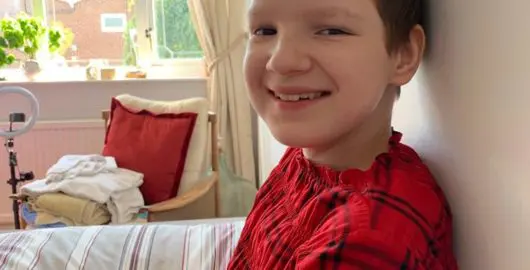
Make a donation
Don't let families like Maisie's face cancer alonePosted on Monday 28 September 2020
